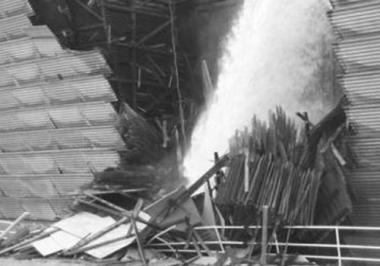Horrifying pictures of a collapsed cooling tower at the Vermont Yankee nuclear power plant in August, 2007 fueled long-standing controversy about whether the 36-year-old plant, located near the borders of Vermont, Massachusetts and New Hampshire, is safe. Residents of all three states intensified their cries for Vermont Yankee to be mothballed permanently in its originally scheduled year, 2012, though its owners have applied to the federal Nuclear Regulatory Commission for an extension of its operating license for 20 years, until 2032.
Now Vermont Yankee's owners, Entergy of Louisiana—also the owners of the Indian Point nuclear plant in Westchester County, New York and the second largest generator of nuclear energy in the country—may be on a collision course with the state of Vermont not over safety, but economics.
Entergy has said recently that it will likely not give the Vermont power companies that buy energy from Vermont Yankee any discounts in addition to the revenue sharing it originally promised when it purchased the plant in 2002. At that time, Entergy said that if the plant got its license extension, from 2012 on Green Mountain Power Corp. and Central Vermont Public Service Corp., Vermont utilities that had previously been part owners of the plant, would get half the additional returns in any year that the electricity from the plant brought a price above a designated level.
Vermont legislators and officials as well as the power companies have said that, in return for a license extension, GMP and CVPS should get discounts in addition to the revenue sharing.
Meanwhile, though the license extension would be granted by the NRC, which so far has been supportive of it in spite of the collapsed cooling tower and other signs of poor maintenance, under a Vermont law passed in 2006, the state Legislature can vote to kill the license extension. The law is the only one of its kind in the country. A vote was expected this month, but has been delayed.
Vermont governor Jim Douglas has supported the license extension over long, vocal protest from many Brattleboro area residents. But there are signs that even his administration is looking less favorably at post-2012 operations at the plant in view of Entergy's current resistance to offering discounts to the two Vermont utilities.
The Legislature has taken a more mixed view of the license extension than the governor for some time. The Advocate spoke with Vermont state representative Tony Klein of East Montpelier, an outspoken advocate of renewable energy who is chair of the House Committee on Natural Resources and Energy. Klein says that with regard to the license extension, the company's refusal to offer the discounts would be a deal-breaker.
"I think it's a huge issue and I think right now it's the key issue," said Klein. "I don't think the administration and the Legislature would have a difference of opinion on that. I've heard from the DPS [the Vermont Department of Public Services] that [Entergy's financial offer] is not good enough."
But would the rest of the Legislature agree with Klein? "I would believe that there wouldn't be votes enough for that plant to keep operating if they continue in this way," said Klein.
Klein's statement is corroborated by what Vermont Senate President Pro Tempore Peter Shumlin told the Associated Press two weeks ago: "There's no way we're going to vote to re-license the plant unless Vermonters are getting a great deal."
A crucial unknown, however, is what the federal government would do if the Vermont Legislature voted against the license extension. Would the NRC recognize a Vermont state law affecting a federally regulated nuclear plant?
"I think you're talking about federal preemption, and I can't predict what their answer would be," said Klein. But he adds that if the NRC says the Legislature's vote is invalid, "… that would be a very interesting states' rights discussion."



